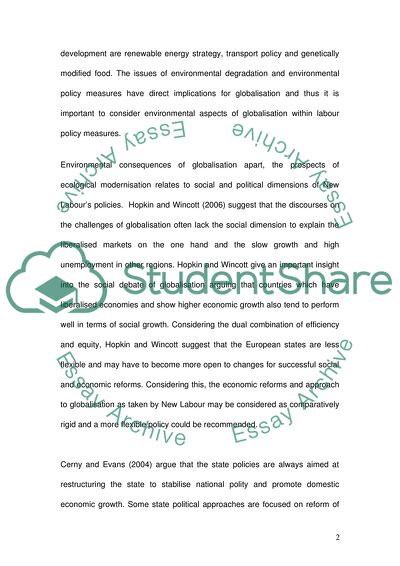
- Home
- Free Samples
- Premium Essays
- Editing Services
- Extra Tools
- Essay Writing Help
- About Us
- Studentshare
- Subjects
- Miscellaneous
- At root Blairism and New Labour politics are designed both to exploit and cope with the social and economic consequences of globalisation, or is it Discuss c
At root Blairism and New Labour politics are designed both to exploit and cope with the social and economic consequences of globalisation, or is it Discuss c - Essay Example

- Subject: Miscellaneous
- Type: Essay
- Level: Undergraduate
- Pages: 4 (1000 words)
- Downloads: 0
- Author: zrau
Extract of sample "At root Blairism and New Labour politics are designed both to exploit and cope with the social and economic consequences of globalisation, or is it Discuss c"
licies within the context of ecological modernisation and environmental reforms suggesting that globalisation has to be understood in terms of political, social and environmental issues. Barry and Patterson analyse New Labour’s approach to globalisation as aimed to create opportunities for ecological modernisation and in some policy areas and hinder in some others. Thus Labour’s focus on globalisation has its own advantages and disadvantages as far as environmental policy measures are concerned.
Some of the prime areas of development are renewable energy strategy, transport policy and genetically modified food. The issues of environmental degradation and environmental policy measures have direct implications for globalisation and thus it is important to consider environmental aspects of globalisation within labour policy measures. Environmental consequences of globalisation apart, the prospects of ecological modernisation relates to social and political dimensions of New Labour’s policies.
Hopkin and Wincott (2006) suggest that the discourses on the challenges of globalisation often lack the social dimension to explain the liberalised markets on the one hand and the slow growth and high unemployment in other regions. Hopkin and Wincott give an important insight into the social debate of globalisation arguing that countries which have liberalised economies and show higher economic growth also tend to perform well in terms of social growth. Considering the dual combination of efficiency and equity, Hopkin and Wincott suggest that the European states are less flexible and may have to become more open to changes for successful social and economic reforms.
Considering this, the economic reforms and approach to globalisation as taken by New Labour may be considered as comparatively rigid and a more flexible policy could be recommended. Cerny and Evans (2004) argue that the state policies are always aimed at restructuring the state to stabilise national polity
...Download file to see next pages Read MoreCHECK THESE SAMPLES OF At root Blairism and New Labour politics are designed both to exploit and cope with the social and economic consequences of globalisation, or is it Discuss c
The Third Way Policies of the Labour Government of 1997-2010
Consequences of Globalization of Labour
New Labour and Globalisation
New Labour - All Style and No Substance
Thatcherism vs. New Labour
Globalization and Economic Policy Control
Consequences of Globalisation
Consequences of Globalization of Labour

- TERMS & CONDITIONS
- PRIVACY POLICY
- COOKIES POLICY